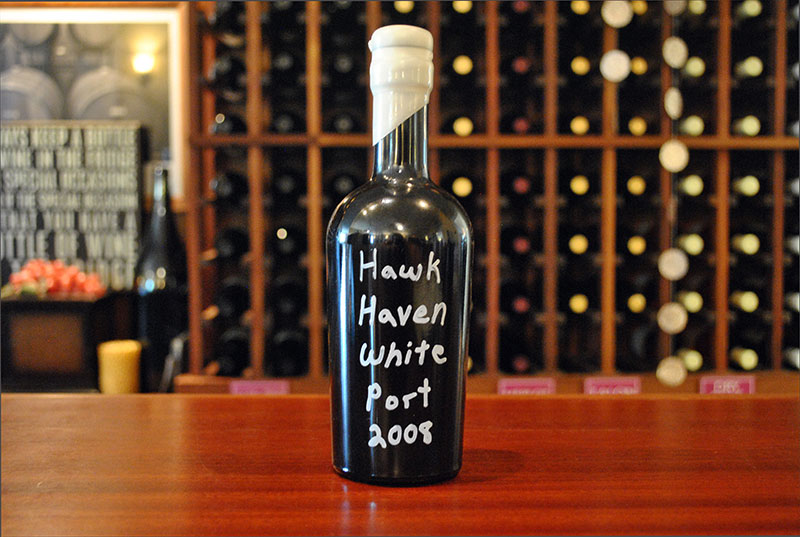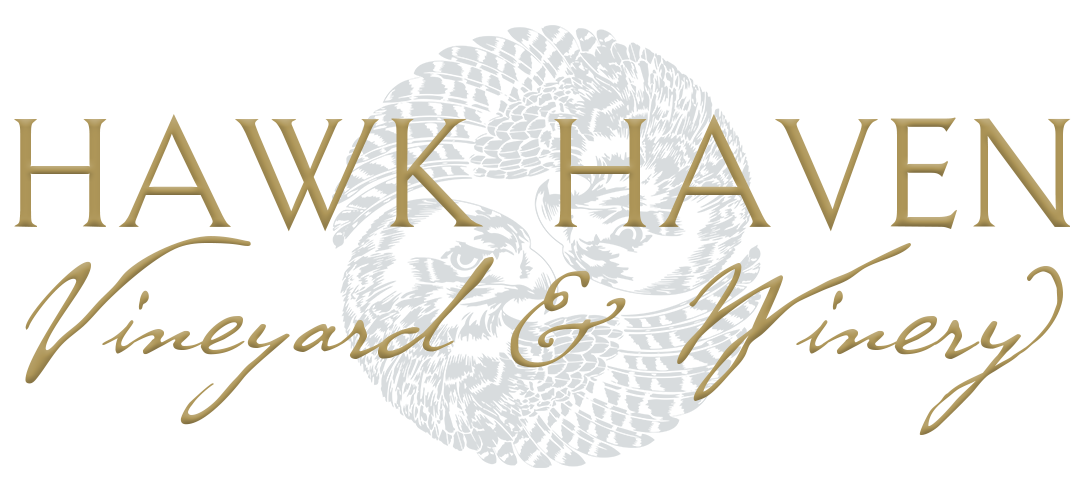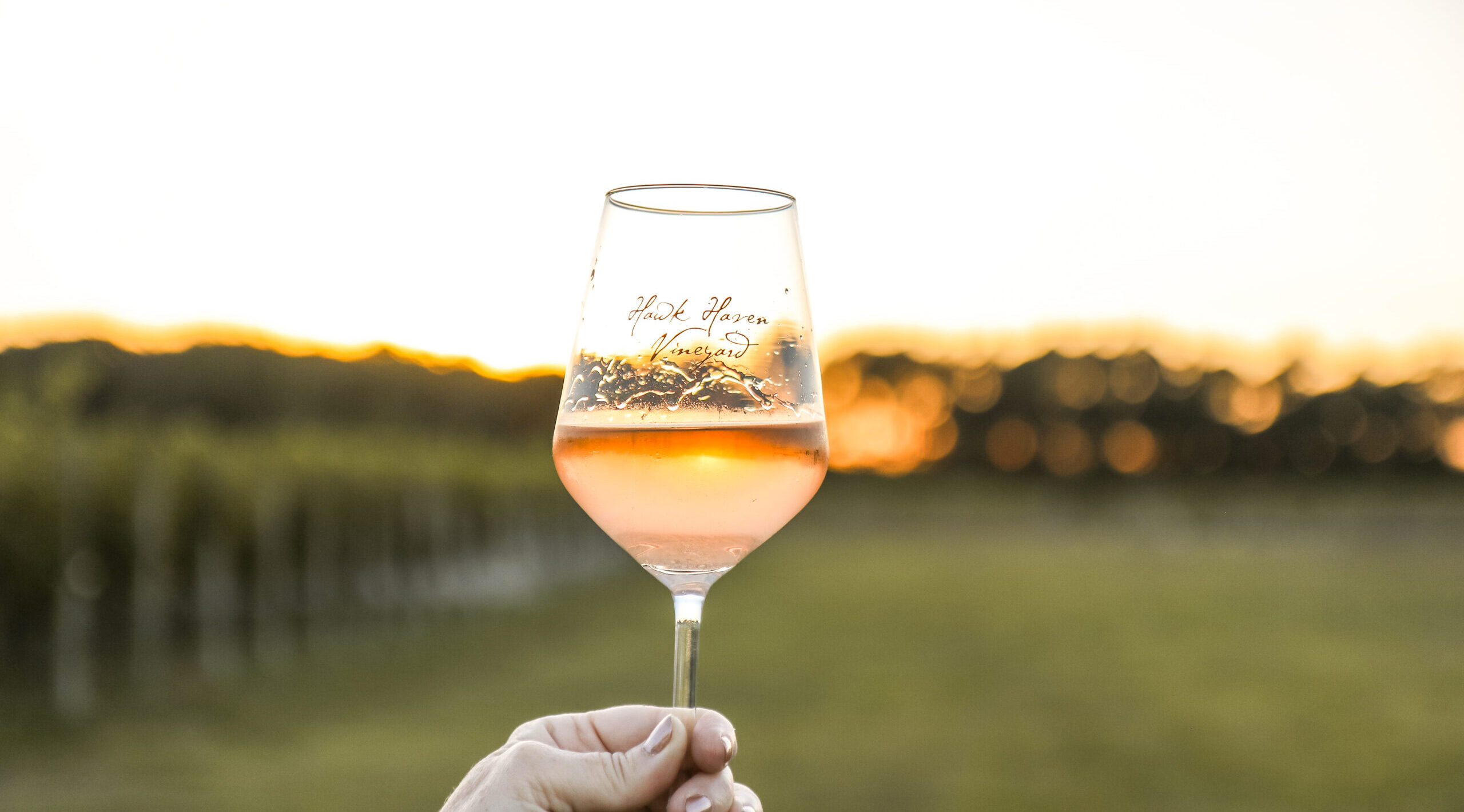
DESSERT IN A GLASS

Some drinkers swear off sweet wines, and others refuse anything else. Dessert wines can come in a variety of sweetness levels and pair with a wide range of foods. At Hawk Haven, we are excited to announce the release of our 2010 White Port this upcoming August 24th weekend. In this week’s Wine Wednesday, we’ll explore a few common types of dessert wine and our newest release.
Four Common Types of Dessert Wines
“Dessert wine” covers a large group of wines and styles. There are several different categorizations, , but we’ll be focusing on four popular types: Sparkling, Lightly Sweet, Very Sweet, and Fortified:
- Sparkling Dessert Wine Sparkling wine is a go-to for food pairing, as bubbles make everything better. Sparkling wine has a great acidity that lightens heavier dishes, and fruit-forward styles complement fruit-based desserts. Moscato d’Asti is the perfect pairing for birthday/wedding cake. Look for Demi-Sec or Semi-Secco for off-dry, and Doux or Dolce for sweet.
- Lightly Sweet Wines Off-dry and semi sweet wines are slightly sweeter than table wine. The Sweet and Fortified Wine Association classifies off-dry as 0.5-1.9% residual sugar (RS), and semi sweet as 2-6% RS. These wines are fantastic for pairing with spicy cuisines, like Indian and Southeast Asian, as the sweetness helps mellow the heat. Fresh fruit tarts, light custards, and biscotti cookies also pair excellently with lightly sweet wines.
- Very Sweet Wines According to the European Union, a sweet wine must have at least 4.5% RS. That being said, many well-known sweet dessert wines have considerably more residual sugar than 4.5%. These wines are achieved by several different methods, but the common goal is concentrating the sugar in the grapes. One method is by leaving the grapes on the vines for a longer time, or having a “late harvest.” Germany’s Spätlese and France’s Vendage Tardive wines are done in this style. Another method is by exposing the grapes to “Noble Rot,” or Botrytis cinerea. This fun-guy is a benevolent fungus that concentrates the grape flavors and sugars in wines. Famous Noble Rot wines include Sauternes from France and Tokaji from Hungary. Another very sweet wine is Ice Wine, or Eiswein. Famously produced in Canada and upstate New York, this method is achieved by leaving the grapes on the vines to freeze and concentrate the sugars.
- Fortified Wines These wines are traditionally thought of as dessert wines, but can branch out into dry wines. Fortified wines, such as Port and Sherry, are made by adding a neutral spirit to an incomplete wine to stop the fermentation process. This addition increases the alcohol content and can leave a high residual sugar, up to 10%. These wines can be nutty and complex with extended aging, and are fantastic with crème brûlée or pecan pie.

Hawk Haven 2010 White PortWhite port is a traditional but rare style of Port made in Portugal. We make ours using Moscato grapes, and add a traditional neutral brandy to stop fermentation. (For more information on that process, check out this fantastic blog by Lynsie about our 2008 White Port!) Moscato’s familiar aromas of mandarin orange, ripe pear, and orange blossom are beautifully transformed through this process into notes of orange marmalade, caramelized pear, and fig. We age our Port in partially-full barrels to encourage oxidation. Our extended aging process brings out a beautiful smoothness and nuttiness in the wine. It’s best served between 42-50°F. Remember that this wine has a high alcohol content (around 18%), so the standard serving size is 3 oz. If you don’t have a Port glass, you can absolutely serve this in a white wine glass instead. Stop in this weekend to pick up your bottle of hand-signed Hawk Haven 2010 White Port!

